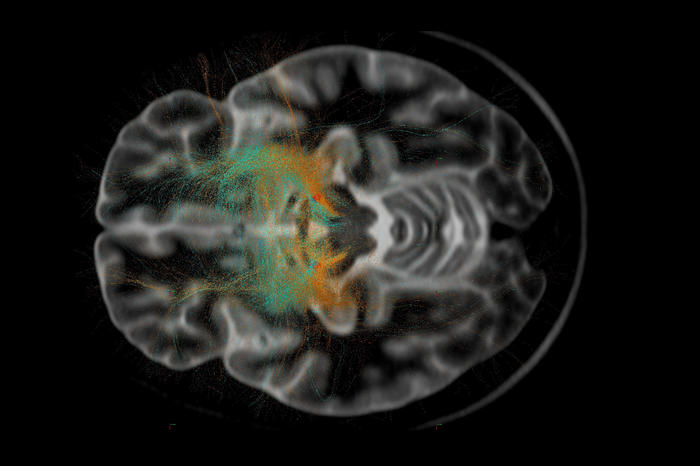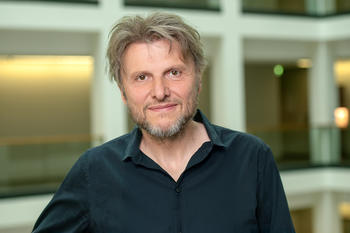NeuroCure
Comprehensive approaches to neurological and psychiatric disorders – from mechanisms to interventions
Fiber tracts in the brain that are influenced by deep brain stimulation in the treatment of Parkinson's disease. Red tracts stand for positive effects, yellow for neutral effects and blue for more negative effects.
Image Credit: Andreas Horn
Neurological and psychiatric disorders affect millions of people and pose significant personal and economic burdens. Researchers in the NeuroCure Cluster of Excellence are working on projects that span all stages of life—from embryonic development to old age. Their goal: to unravel how the brain works in order to better understand diseases such as Alzheimer’s, depression, epilepsy, Parkinson’s, stroke, and schizophrenia.
At the heart of their work is translation—the direct path from basic research to clinical application. The Neuroscience Clinical Research Center (NCRC) plays a key role in this process: insights gained in the lab are translated into clinical studies, providing patients with early access to innovative diagnostic and therapeutic options.
Their research approaches range from molecular techniques and imaging methods to behavioral biology and neuropsychological studies. The focus includes developmental disorders as well as diseases such as Parkinson’s, multiple sclerosis, dementia, and epilepsy, alongside various psychiatric conditions such as schizophrenia, addiction, and depression. To support neuroscience research, state-of-the-art equipment and expert knowledge are made available through centralized facilities.
NeuroCure provides unique insights into our biological supercomputer - the brain
Since 2007, the NeuroCure Cluster of Excellence at Charité – Universitätsmedizin Berlin has been conducting research on neurological and psychiatric disorders as well as the complex mechanisms of the healthy brain. Funded initially through the Excellence Initiative and, since 2019, through the German federal and state governments’ Excellence Strategy, NeuroCure has played a pivotal role in shaping neuroscience research in Berlin. With more than 40 newly established research groups and cutting-edge infrastructure, the cluster has made a lasting contribution to strengthening Berlin as a hub of knowledge and innovation.
A central focus of NeuroCure is the close integration of basic research and clinical application to accelerate the translation of scientific discoveries into therapies. Researchers employ a wide range of methods, including molecular analyses and advanced imaging techniques. One of the highlights of NeuroCure’s research is the Octapatch—a remarkable instrument that makes the electrical activity of nerve cells visible. Through innovations like this, the Cluster of Excellence provides unique insights into our biological supercomputer – the brain.
ㅤ
"We at NeuroCure are absolutely delighted about the renewed funding. It’s a fantastic opportunity to translate findings from basic research even more effectively into clinical applications, paving the way for new diagnostic and therapeutic approaches. This would not be possible without the close collaboration with our colleagues from various disciplines and institutions."
Dietmar Schmitz, spokesperson for NeuroCure
NeuroCure aims to uncover shared mechanisms underlying neurological disorders such as Parkinson’s, dementia, and depression, while also developing new treatment approaches. Through this work, NeuroCure positions itself as a pioneer in the field of neuroscience. A deeper understanding of both the healthy and diseased brain is essential for developing targeted therapies and treating neurological and psychiatric conditions more effectively.
Spokesperson: Prof. Dr. Dietmar Schmitz (Charité – Universitätsmedizin Berlin) Applicant universities: Freie Universität Berlin and Humboldt-Universität zu Berlin are parent universities of the Charité – Universitätsmedizin Berlin. Participating Institutionen:- German Center for Neurodegenerative Diseases (DZNE) Berlin
- Leibniz-Forschungsinstitut für Molekulare Pharmakologie (FMP) Berlin
- Max Delbruck Center for Molecular Medicine (MDC) Berlin
- Berlin Institute of Health (BIH)
- German Institute of Human Nutrition Potsdam-Rehbruecke (DIfE)
- Max Planck Unit for the Science of Pathogens Berlin (MPUSP) Berlin


